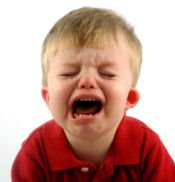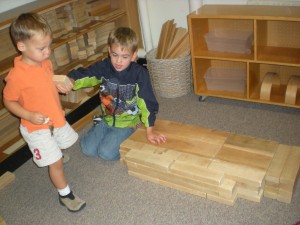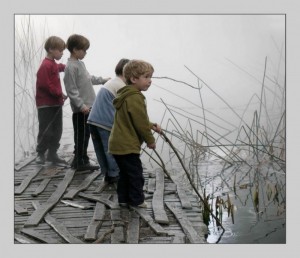Children and the Power of Play
 Parent’s and children’s brains don’t work the same. That statement won’t surprise any parent. Here is a story you will all relate to. Ted age two hits Sally age 9 months. Sally begins to cry. You hear Sally and come running because lately Ted has been hitting her more often. Hitting his sister is not ok and you feel very angry. You grab Ted by the shoulders hard, sit him in a chair, and for the 50th time yell at him that it’s not ok to hit his sister. Of course, Ted begins to cry.
Parent’s and children’s brains don’t work the same. That statement won’t surprise any parent. Here is a story you will all relate to. Ted age two hits Sally age 9 months. Sally begins to cry. You hear Sally and come running because lately Ted has been hitting her more often. Hitting his sister is not ok and you feel very angry. You grab Ted by the shoulders hard, sit him in a chair, and for the 50th time yell at him that it’s not ok to hit his sister. Of course, Ted begins to cry.
In your mind it’s obvious that your grabbing and yelling are connected to Ted hitting his sister. You are wondering why Ted isn’t getting the lesson yet. You are angry and want this behavior to stop. That’s the message you are intending to send, right? It might not be the best method, but it’s a reasonable message.
This is how Ted’s brain works, “Mommy’s angry so she yells and hurts me.” Despite your well intended message, the message Ted’s brain gets is that we yell and strike out when we’re angry. Unfortunately, there’s no connection between your yelling and the hitting of Sally, although in our minds it should be obvious.
My point with this example is not to discuss discipline issues, but to simply show that children’s minds don’t process or see the same as our adult minds do.
This is especially true in the arena of learning. Children and adult brains see or process learning differently.
Bottom line, children learn through play, play that may look to adults like meaningless, directionless, frivolous time-wasting.
“Many scientists believe play is hard-wired; a central part of neurological growth and development — one important way that children build complex, skilled, responsive, socially adept and cognitively flexible brains. NYT:Taking Play Seriously 2/17/08
Psychiatrist Stuart Brown, president of the National Institute for Play created in 1996 said “If you look at what produces learning and memory and well-being, play is as fundamental as any other aspect of life, including sleep and dreams.” NYT:Taking Play Seriously 2/17/08
“Parents bobble between a nostalgia-infused yearning for their children to play and fear that time spent playing is time lost to more practical pursuits. Alarming headlines about U.S. students falling behind other countries in science and math, combined with the ever-more-intense competition to get kids into college, make parents rush to sign up their children for piano lessons and test-prep courses instead of just leaving them to improvise on their own; playtime versus résumé building.” NYT:Taking Play Seriously 2/17/08
Decades of research has shown that play is crucial to physical, intellectual, and social-emotional development at all ages. This is especially true of the purest form of play: the unstructured, self-motivated, imaginative, independent kind, where children initiate their own games and even invent their own rules.
“Play is motivated by plea sure. It is instinctive and part of the maturational process. We cannot prevent children from self-initiated play; they will engage in it when ever they can. The problem is that we have curtailed the time and opportunities for such play.” David Elkind, Ph.D., The Power of Play: Learning That Comes Naturally.
The temptation we have as adults, especially if we care about our children’s education, is to interfere with our children’s play, trying to make it more structured, directed, with meaningful outcomes. All with good intentions, to enhance their learning experience.
But remember, children’s brains don’t process the same as adults. Managed, directed, structured play ultimately becomes something other than play, and its play that our children’s brains really need.
“For most of human history, children played by roaming near or far in packs, large and small. Younger children were supervised by older children and engaged in freewheeling imaginative play. They were pirates and princesses, aristocrats and heroes. But, while all that play might have looked a lot like time spent doing nothing much at all, it actually helped build a critical cognitive skill called executive function. Executive function has a number of elements, such as working memory and cognitive flexibility. But perhaps the most important is self-regulation— the ability for kids to control their emotions and behavior, resist impulses, and exert self-control and discipline. Executive function — and its self-regulation element — is important.
“Poor executive function is associated with high dropout rates, drug use and crime. In fact, good executive function is a better predictor of success in school than a child’s IQ. Unfortunately, play has changed dramatically during the past half-century, and according to many psychological researchers, the play that kids engage in today does not help them build executive function skills. Kids spend more time in front of televisions and video games. When they aren’t in front of a screen, they often spend their time in leagues and lessons — activities parents invest in because they believe that they will help their children to excel and achieve. And while it’s true that leagues and lessons are helpful to children in many ways, (researcher Deborah Leong says) they have one unfortunate drawback. (Leong is professor emeritus of psychology and director of the Tools of the Mind Project at Metropolitan State College of Denver.)(She says) when kids are in leagues and lessons, they are usually being regulated by adults. That means they are not able to practice regulating themselves. “As a result,” (Leong says,) “kids aren’t developing the self-regulation skills that they used to.” Creative Play Makes for Kids in Control by ALIX SPIEGEL
Please do not misunderstand me. What I am NOT saying is that we should allow our children to run feral, although more feral activities would probably do our children some good. I am also NOT saying that as parents we don’t have a role to play in bringing some direction and structure to our children’s activities.
What I AM saying is that we would do well, or more accurately, our children would do better if we resisted the temptation to make their play better, more meaningful and directed, so that we could feel better about their learning outcomes.
 I have a favorite analogy that I like to use to help me better internalize what my real role is as a parent mentor for my children.
I have a favorite analogy that I like to use to help me better internalize what my real role is as a parent mentor for my children.
What a great teacher or mentor does is walk along with a child, hand in hand. As they walk together the great mentor opens doors and invites and inspires the child to walk through.
Our temptation is to drag our children along pushing them through doors that we feel would be best for them to enter.
My hope is that you begin to have a mental shift about what’s happening in the brains of your children as they engage in natural core and love of learning activities. Rather than feeling desperate or discouraged about their endless play and seemingly lack of interest in more academic attentions, rather walk along with your children as their brains and learning naturally develop and mature. As you walk hand in hand together through core and love of learning, prepare appropriately to open doors along the way, and do the work necessary to effectively invite and inspire your children to walk through. And by the way, it’s fine if they don’t. The door isn’t closed forever.
What does it actually look like to walk hand in hand and effectively open doors, and invite and inspire your children to walk through? Consider reviewing the Leadership Education Continuum that identifies what your three jobs are as a parent mentor.
Check out the Leadership Education Continuum HERE.
Possibly Related Posts:
- Self Care for Better Parenting – Part 2
- Self Care for Better Parenting – Part 1
- Got Kids 24/7 – 2 Tips to make life easier
- The Screen Free Experiment
- 5 Tips to Put Family first




{ 2 comments… read them below or add one }
Thank you for this wonderfully written reminder to honor playing in childhood. I believe that restoring imagination is vital in an ever changing world! Your words mirror this video beautifully..http://www.youtube.com/watch?v=LjCr3h1MOYw
Play IS the child’s work; thank-you